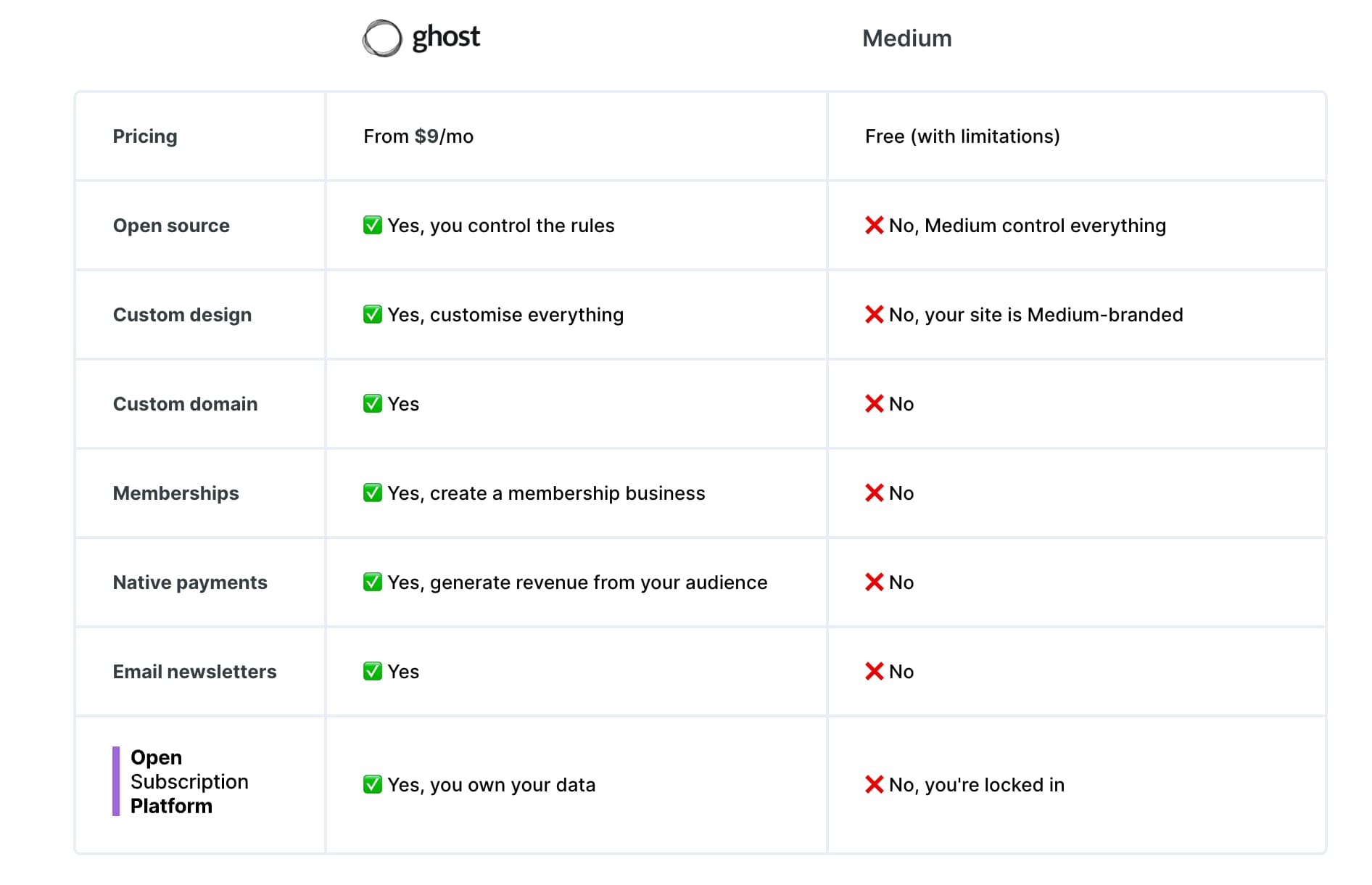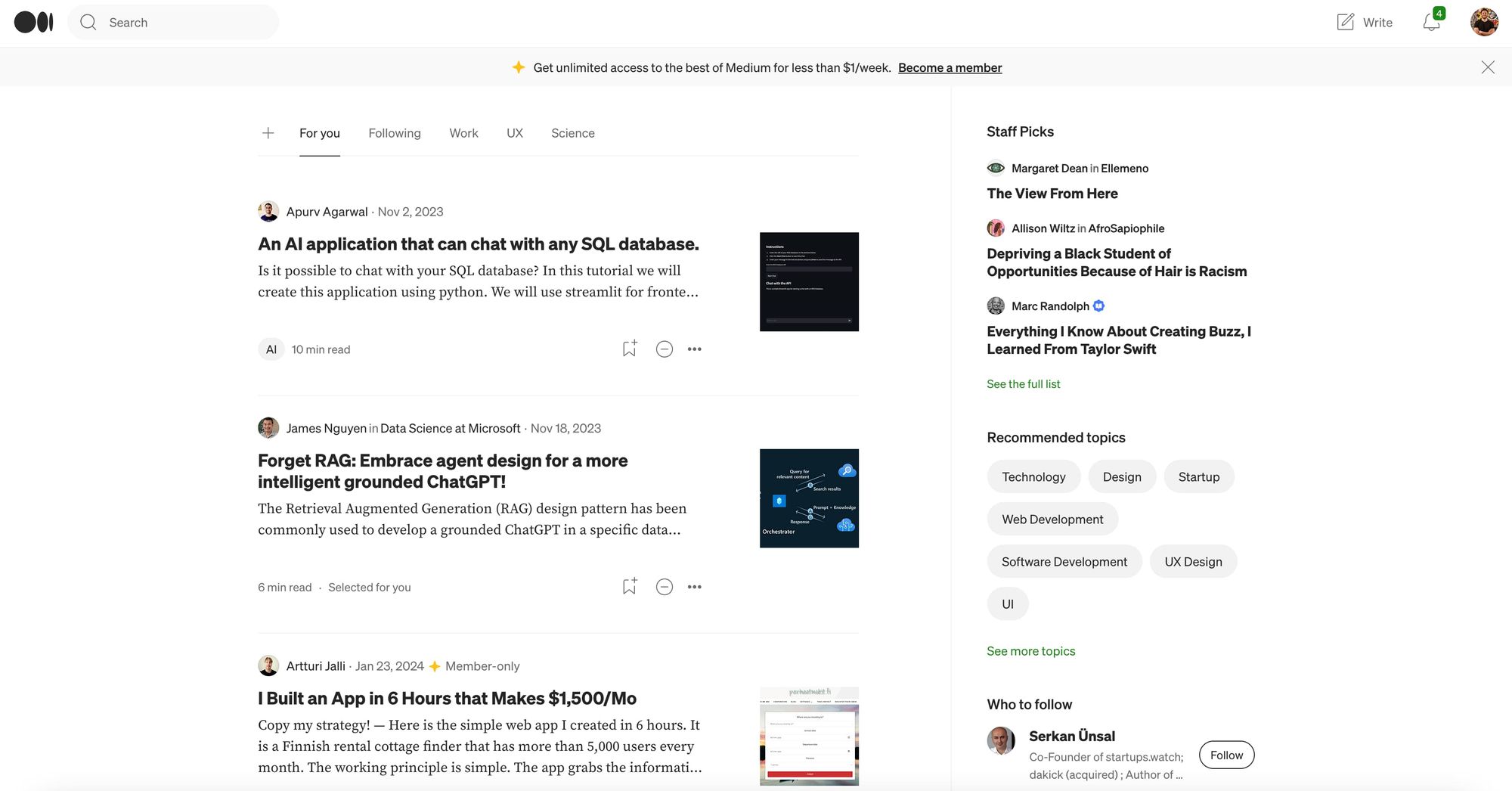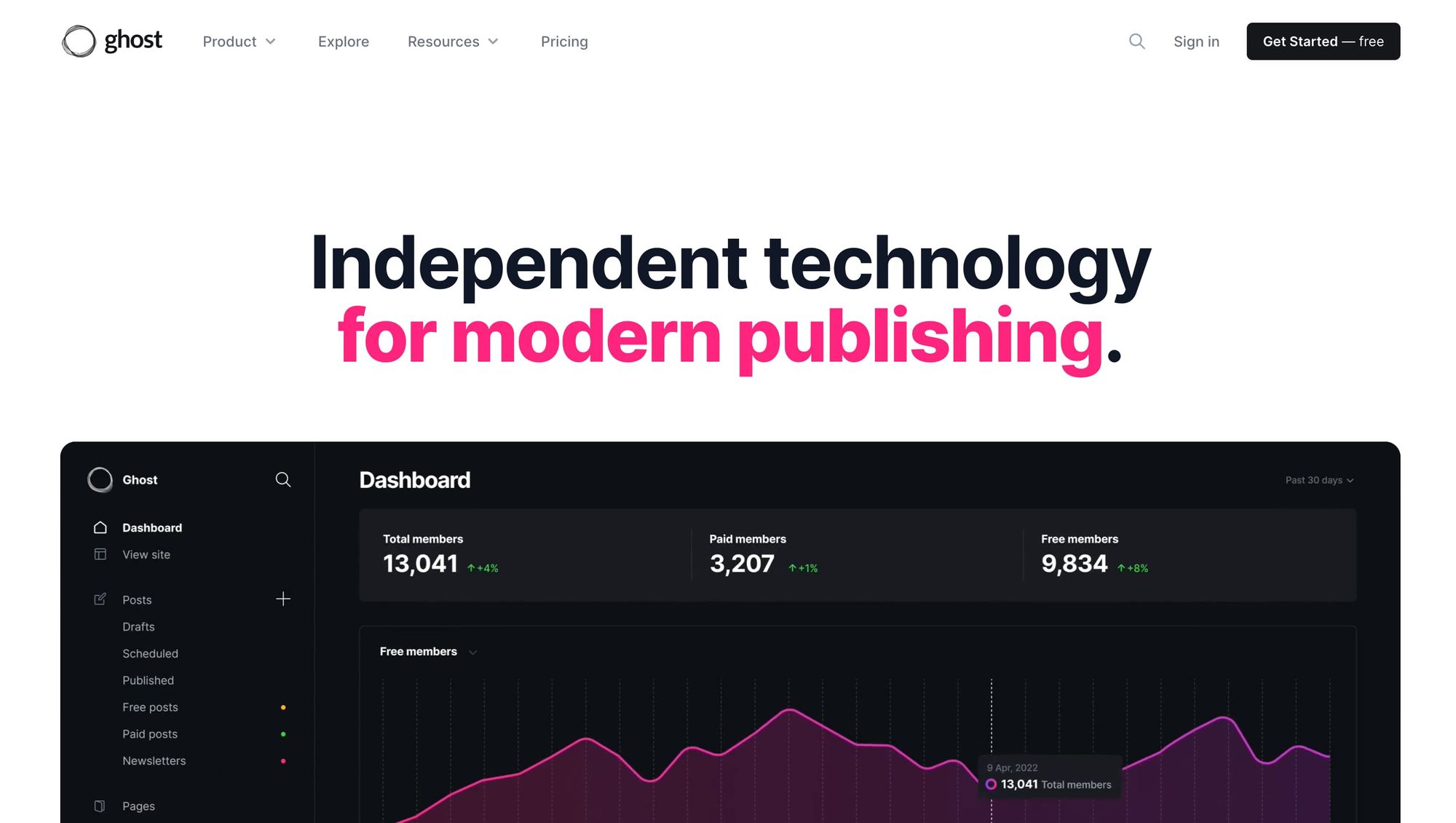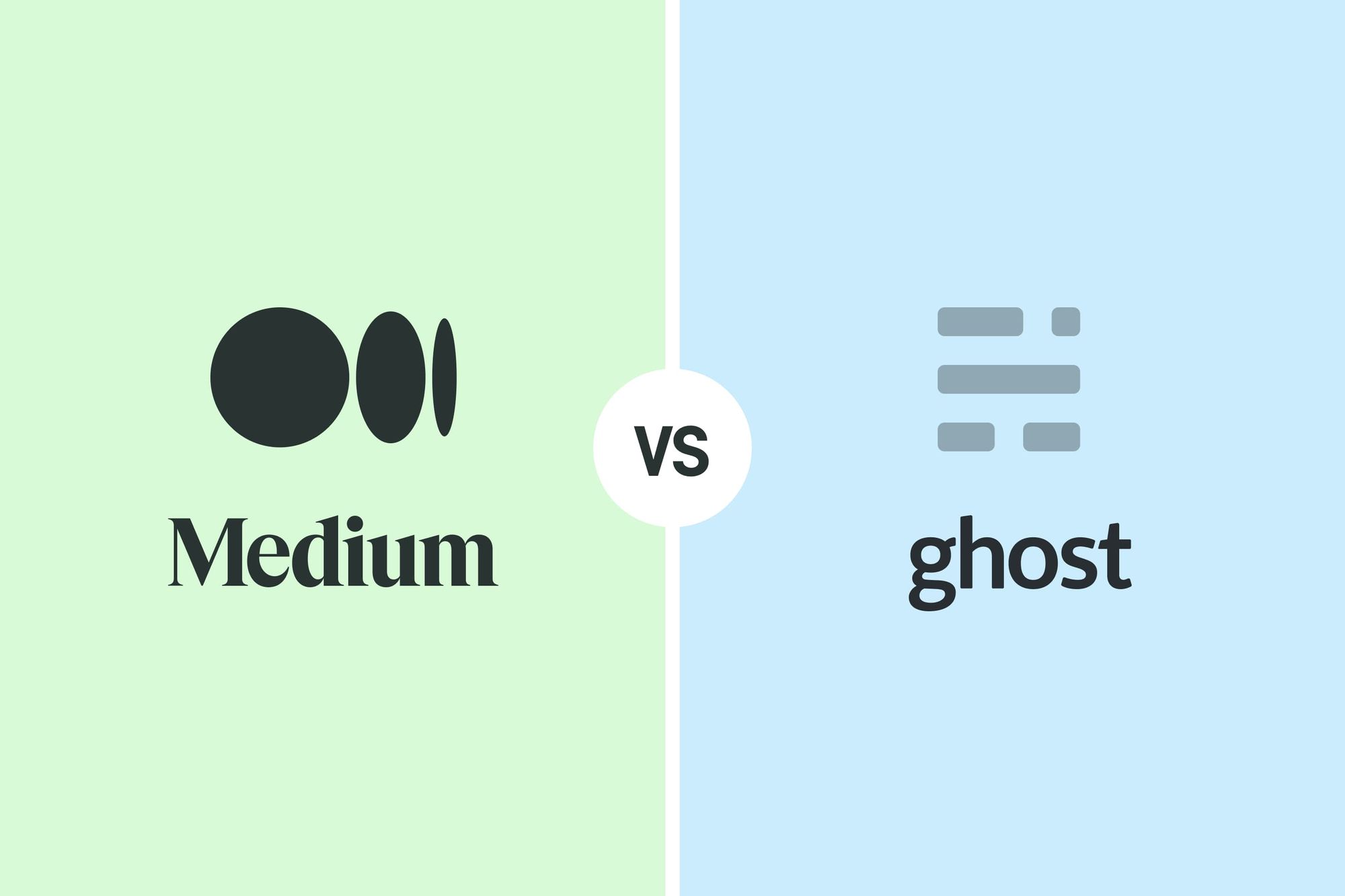In the world of blogging and content creation, the choice of platform can significantly impact the reach, engagement, and even monetization of your content. With numerous options available, two platforms often stand out due to their unique features and offerings: Medium vs Ghost CMS.

On the other hand, Ghost CMS appeals to those seeking full control over their content and site design, offering a powerful, albeit more hands-on, alternative.
But how do you know which platform is best for your needs? Whether you’re a seasoned blogger considering a switch or a newcomer trying to decide where to start, this post will delve into the advantages and disadvantages of both Medium and Ghost CMS, aiming to guide you toward making an informed decision that aligns with your blogging ambitions.
All content, images and authors can be seamlessly migrated from Medium to Ghost without any disruption to your readers.
Medium – The Popular Choice for Beginners

Pros of Medium
1. Ease of Use
One of Medium’s most appealing features is its user-friendly interface. Sign-up is straightforward, and you can start writing your first post within minutes. The platform's blog post editor is intentionally simple yet powerful, requiring little to no learning curve. This accessibility makes Medium an attractive option for beginners and those who prioritize writing over website management.
2. Monetization Opportunities
Medium’s Partner Program allows writers to earn money based on how much members engage with their content. This model provides a direct path to monetization without the need for ads or affiliate marketing, appealing to bloggers looking to earn from their writing directly on the platform.
3. Built-In Audience
With tens of millions of monthly visitors, Medium provides a significant built-in audience ready to discover new content. The platform's algorithm promotes stories to interested readers, helping authors reach a larger audience without their own marketing efforts. Additionally, publishing within Medium’s publications can expose your content to specific communities and increase your visibility.
4. SEO Advantage
Medium’s strong domain authority is a boon for bloggers aiming for visibility on search engines. A well-written, SEO-friendly post on Medium has a good chance of ranking higher in search results, sometimes faster than content on a brand-new personal blog would.
Cons of Medium
1. Medium Owns You
While writing on Medium can offer initial exposure, the platform ultimately controls how your content is presented and shared. Medium owns the rights to your content, meaning significant changes to the platform or its policies could affect your visibility and success without your input.
2. Medium Doesn’t Care About You
The harsh reality is that Medium’s priorities lie with its business goals, not individual authors. Success on Medium can be ephemeral; algorithm changes and shifting platform priorities can quickly diminish your content’s reach.
3. Limitations
Being a Medium author means accepting certain limitations. You can’t fully customize the look of your blog, use your own domain, or freely implement affiliate marketing strategies, which can be restrictive for those looking to build a personal brand or business.
4. Affiliate Marketing Restrictions
While Medium allows affiliate links, its guidelines and future policy changes could restrict or eliminate their use, potentially impacting authors who rely on affiliate marketing as a revenue stream.
Ghost CMS – The Independent Publishing Powerhouse

Pros of Ghost CMS
1. Complete Control
The hallmark of Ghost CMS is the unrivaled control it offers over your content and its presentation. Unlike Medium, where the platform dictates the layout and design, Ghost allows you to own your content fully. This means you have the freedom to customize your site's appearance, functionality, and even the underlying code if you're technically inclined.
2. Customization and Branding
With Ghost, your blog can stand out from the crowd thanks to extensive customization options. You're not limited to a one-size-fits-all design; instead, you can tailor your site's look and feel to match your brand, using custom themes and integrations. This level of customization ensures that your blog reflects your unique identity and appeals directly to your target audience.
3. Membership and Monetization
Ghost CMS goes beyond basic blogging to support scalable monetization models. It lets you easily set up memberships and subscriptions, allowing you to create a steady revenue stream by offering exclusive content to paying members. This is a game-changer for bloggers focused on building a business around their content, providing tools to manage and grow a subscriber base directly from the platform.
4. SEO and Integration
Ghost places a strong emphasis on SEO, offering advanced features to boost your content's visibility on search engines. The platform supports custom URL structures, meta tags, and rich snippets out of the box, making it easier to optimize your site for Google and other search engines. Additionally, Ghost can be integrated with a wide range of third-party services, from email marketing tools to analytics platforms, enhancing your blog's functionality and reach.
Cons of Ghost CMS
1. Initial Setup
The flip side of Ghost’s flexibility is the complexity of its initial setup. Unlike Medium, where you can start publishing immediately, setting up a Ghost blog requires a bit more technical know-how, including domain registration, hosting configuration, and theme installation. This can be a barrier for non-technical users or those looking for a more straightforward blogging solution. You can consider our guide about how to install Ghost on Ubuntu.
2. Learning Curve
Given its array of features and customization options, Ghost comes with a steeper learning curve. New users may need to spend some time getting familiar with the platform's interface and features to fully leverage its potential. This learning process, while rewarding, might be daunting for bloggers seeking simplicity.
3. Hosting and Maintenance
With great power comes great responsibility. Running a Ghost blog means you're in charge of hosting, security, backups, and software updates. While this offers maximum control, it also adds a layer of technical responsibility that some bloggers may prefer to avoid. Opting for Ghost(Pro), the official hosting solution by Ghost, can alleviate some of these concerns but at an additional cost.
Comparison and Decision-Making Criteria

When deciding between Medium and Ghost CMS, consider your long-term goals, technical ability, and the level of control you wish to have over your site. Medium offers a straightforward path for beginners to start blogging and reach an existing audience quickly. However, its limitations can be restrictive for those looking to expand or monetize their blog beyond what the platform allows.
Ghost, on the other hand, caters to bloggers and publishers aiming for full control over their content, appearance, and monetization strategy. It’s an excellent choice for building a distinct online presence and growing a dedicated audience, provided you're willing or able to handle the platform's technical demands.
FAQ About Ghost vs Medium
What Is Medium and Who Should Use It?
Medium is a user-friendly blogging platform that prioritizes ease of use and access to a built-in audience. It's ideal for beginners, writers who want to focus solely on content creation without worrying about the technical aspects of website management, and those looking to quickly reach an existing audience.
What Is Ghost CMS and Who Should Use It?
Ghost CMS is an open-source, customizable blogging platform designed for bloggers, content creators, and publishers seeking full control over their website's appearance, functionality, and monetization. It's best suited for those with some technical know-how or the willingness to learn, and for individuals or businesses focused on building a brand or a membership-based community.
Can I Monetize My Blog on Medium and Ghost CMS?
Yes, both platforms offer monetization opportunities. Medium allows writers to earn through its Partner Program, paying authors based on how much attention their stories receive from paying members. Ghost CMS, on the other hand, provides tools to set up memberships and subscriptions directly on your site, offering full control over monetization strategies.
Do I Need Technical Skills to Use Ghost CMS?
While having technical skills can help you make the most of Ghost CMS's customization features, the platform itself is designed to be user-friendly. Setting up a basic blog on Ghost does not require advanced technical knowledge, especially if you opt for Ghost(Pro), which takes care of hosting and maintenance. However, customizing themes and integrating third-party services might require some technical familiarity.
How Does Content Ownership Work on Medium vs. Ghost CMS?
On Medium, while you retain ownership of your content, you grant Medium a broad license to use, distribute, and display your content across their platform. This means they have significant control over how your content is presented and monetized. With Ghost CMS, you retain full ownership and control over your content, with no platform-imposed restrictions on how it's used or shared.
Is It Easy to Switch from Medium to Ghost CMS?
Transitioning from Medium to Ghost CMS can be relatively straightforward, especially since Ghost CMS supports content importation from other platforms. While some manual adjustments might be necessary to adapt your content to Ghost's features and customization options, the platform offers guides and support to facilitate migration.
Can I Use My Own Domain Name on Both Platforms?
Ghost CMS allows and encourages the use of custom domain names to reinforce your brand's identity. Medium, however, does not support custom domains for individual writers. Medium publications (created for specific groups or topics) could previously use custom domains, but this feature is no longer offered to new publications.
What Support Options Are Available for Medium and Ghost CMS Users?
Medium offers support primarily through its help center, with resources and FAQs designed to assist writers. Direct support options may be limited. Ghost CMS, being open-source, benefits from a vibrant community where users can seek help, along with detailed documentation. Ghost(Pro) customers also have access to dedicated email support.
Choosing the right blogging platform is a crucial decision that can influence the success and growth of your online presence. Medium is a solid choice for those new to blogging or looking for a hassle-free way to share their thoughts online. Meanwhile, Ghost CMS is better suited for independent publishers and content creators seeking extensive customization, control, and direct monetization options.
Remember, there’s no one-size-fits-all answer. Your specific needs, skills, and vision for your blog should guide your choice. Regardless of the platform you choose, the key to success lies in consistently producing quality content that resonates with your audience.
If you need more information about the comparison, you can check ghost.org's official comparison and another good review about the comparison.

